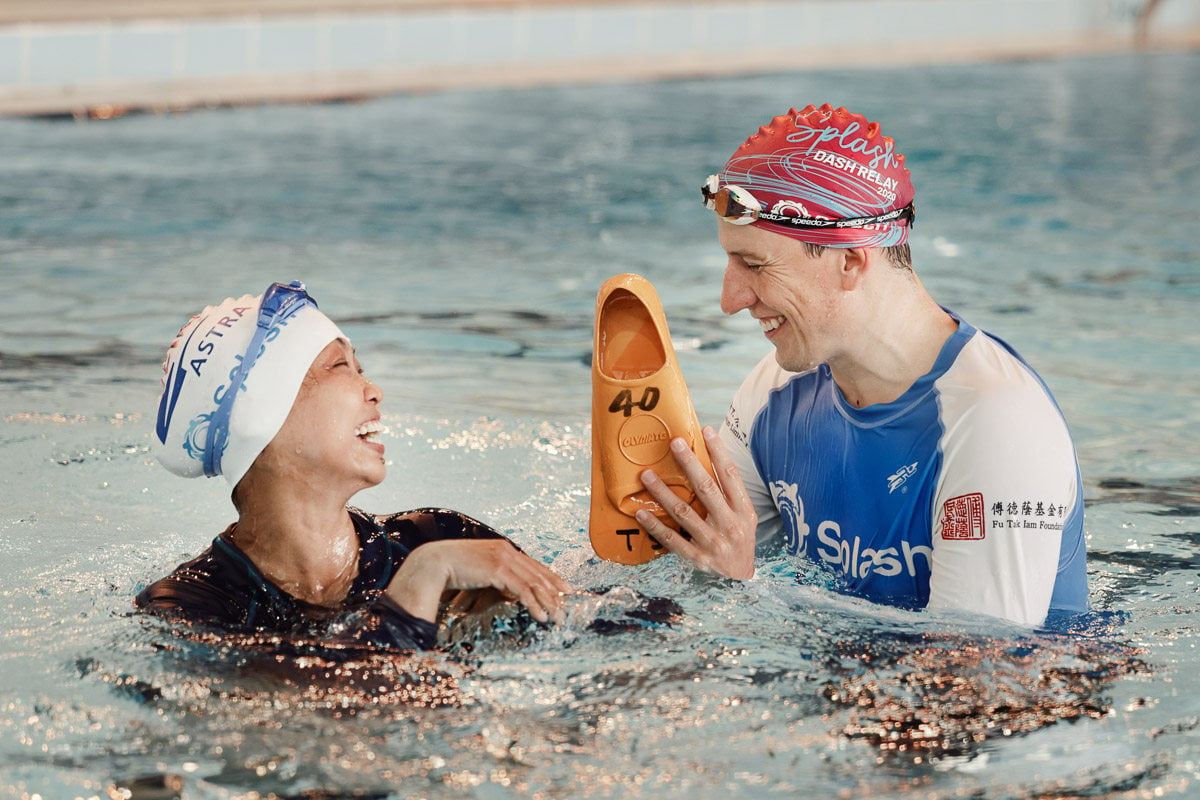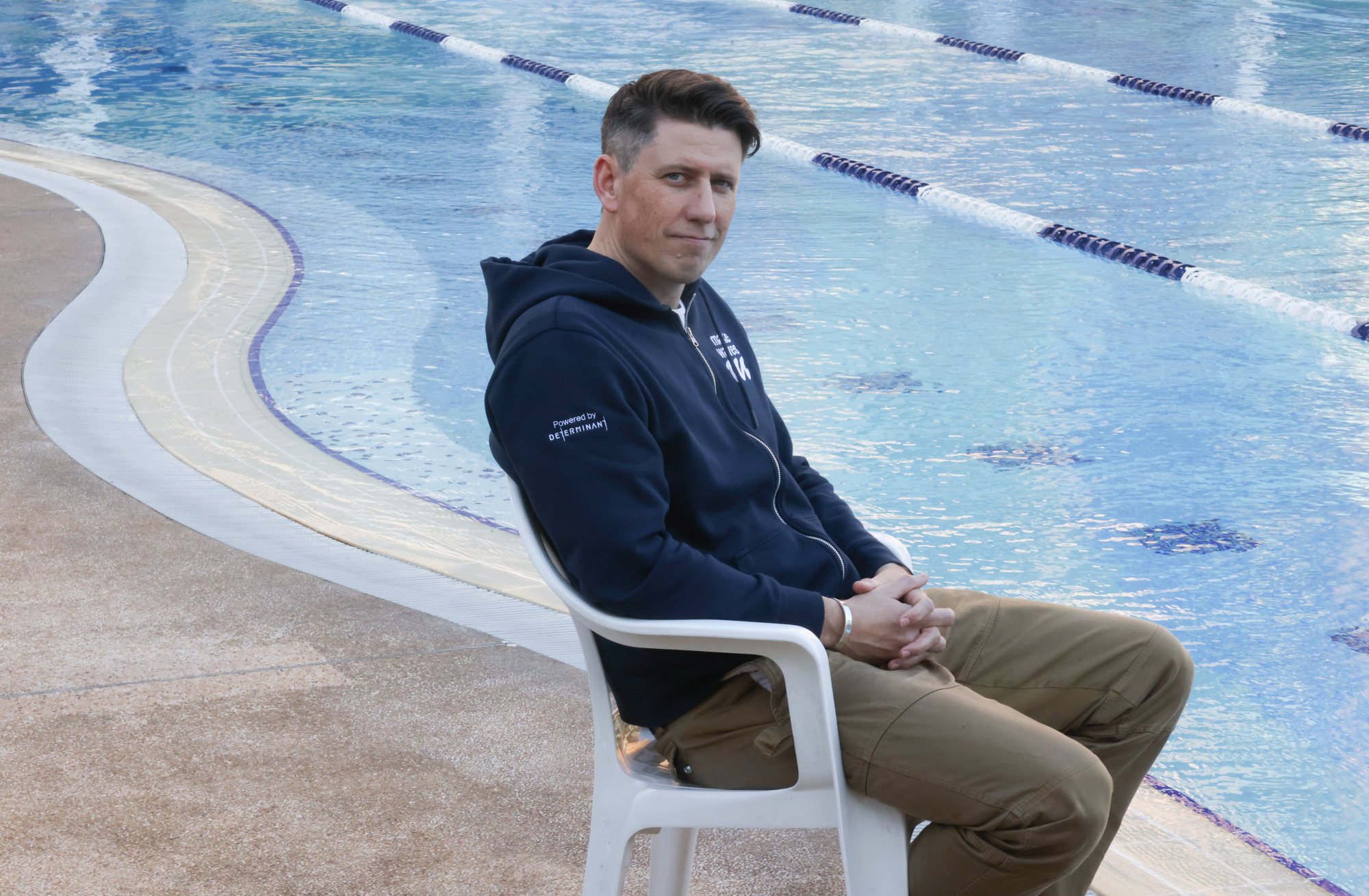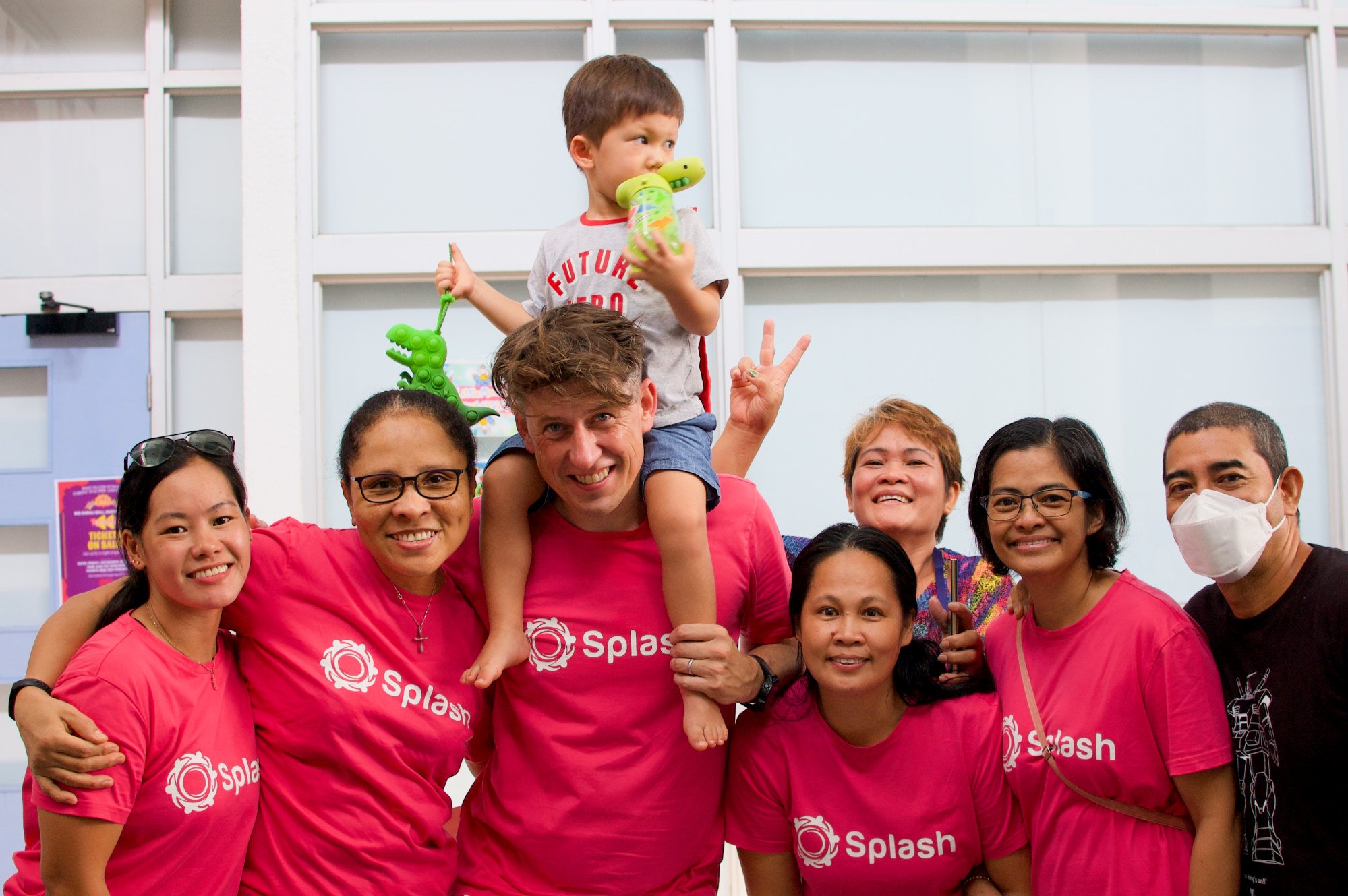
- Simon Holliday recalls the moment that led him to co-found Hong Kong non-profit swim school Splash Foundation, and his own open-water swimming exploits
I was born in 1978, near Ashford, Kent, southeast England, and we moved to Cambridgeshire when I was about four.
I learned to swim when I was four and was so proud to get my purple 10 metres (33 feet) badge. My mum sewed it into my swimming shorts.
I got close to it and came up. She tapped her watch and said, “Come on, Simon, we haven’t got all day.” I tried a second time and failed. All the other kids laughed.
I cried in the car on the way home. Swimming was something I felt I was good at and that had been taken away from me. It had a lasting impact and I did not swim for 20 years. I got into other things. Football felt easier and I played from the age of about 10.

Therefore I am
I did a degree in international politics at Lancaster University, a campus university on the edge of the Lake District in northwest England. I had the best three years of my life.
It’s ‘a losing battle’ against abandoned fishing nets. He’s fighting anyway
I loved feeling a bit lighter when a philosophy lecturer was talking about the existence of a table – “is it here or not and how do you know” – and all these concepts I had not come across before.
I would be floating on these ideas as I walked along the spine of the campus back to County College, where I knew 400 people in our quad, and then be in the bar and play a few games of pool and have a few beers.
I was on the football team. It was a total bubble, but a wonderful time.
Nigerian ambitions
Soon after I graduated, in 2000, I spotted an ad in The Guardian that said, “Work in Africa, help develop a new university”. I got the job and was in the rural southeast of Nigeria for almost a year.

The university had only been built a few years earlier and was typically Nigerian in its ambitions but it did not have basic things like books. I taught a lecture course on international relations.
I have always enjoyed the teaching process. For me, that is when you really learn something, when you have to get that message across to somebody else.
There are parameters of what you are trying to understand, and you need to push against those parameters to package that into the message that you get across to other people.
Finding a niche
After Nigeria, I went back to London and worked in PR for a few years. I worked at national railway infrastructure manager Network Rail in the government corporate affairs team, first in external communications and then internal.

It was at the time of the train disasters at Hatfield and Potters Bar, where people were killed. I found the PR side hard. It was all reactive PR, batting off aggressive journalists. But I enjoyed the internal comms.
I had a great boss, she was my line manager but also became my coach and we spent an hour every few weeks talking about my goals. She said, “If you don’t have a plan, you’re in someone else’s.”
I gained confidence and figured out that teaching was what I wanted to do.
Grey areas
I got into learning and development. PR was all about seeing things in black and white – you have a line to take and you stick with it.
I wanted to find something that I was really good at – if I could swim the Channel, then I could overcome any other challenges in lifeSimon Holliday
I was never someone who saw in black and white, I saw in the grey in between. And in learning and development you can do that because it is about ideas and how you help people get better, but there is no obvious right and wrong.
It is feeling your way through and using your intuition.
Channelling energy
When I was about 26, I began doing triathlons. To do them, I needed to be able to swim properly. I found a very patient coach and had one-to-one lessons for six months at Ironmonger Row Baths in London.
That is when I got good at swimming, I got the breathing right. I realised it was the swimming part of the triathlons I most enjoyed.

Love what you do
I trained for that for two years. In the winter, I trained in pools and May to August swam off the beach at Dover Harbour. The salinity is very high, so your tongue gets very big and when you get out, you are so cold you cannot hold a cup of cocoa.
What I learned is that you have got to find a way of enjoying what you are doing. The people who were there could do it, because they had chosen to be there, and they were just enjoying the moment.
It took me a year to get used to the cold; part of that was physiological, but a lot of it was mental. In 2011, I swam the Channel. That set me on a path of adventure.

Meeting Maggie
At the end of my time in Hong Kong, I met Maggie, a lawyer, and we kept in touch. She is mainland Chinese. I went back to London and then came back to Hong Kong to cover another secondment.
Maggie and I got together at the end of 2013 and I got a permanent job in Hong Kong.
Helping the helpers
In Hong Kong, I joined the open-water swimming group in Repulse Bay. In May 2014, I swam from Hong Kong to Macau.
Swimming is a vehicle for what is a really empowering experience. The best way we can turn the tide on swimming illiteracy is getting families to swimSimon Holliday
It was hard because we had to go between the ferries, but it was really special. The film crew caught the time when a dozen Chinese white dolphins swam around me for an hour. It was incredible; there is not a lot of footage of that number of white dolphins in one place.
I was aware when I swam in open water or with master swim groups that there was a mix of people who did it, but they were all affluent middle-class Europeans and a few Chinese. There were no domestic helpers.
At the end of 2014, I posted a message on an email group and said I was thinking of setting up a swim school and was anyone interested in helping out.
Libby Alexander was the first person to respond. We started with the idea of providing swimming lessons for people who have not had the opportunity.

Super model
It was initially aimed at domestic helpers and in 2017 we applied for charitable status. To do that, we had to support a broader cross-section of Hong Kong society, so we started doing kids’ programmes.
We can get people who cannot swim to be able to swim in 10 to 12 weeks, or 20 hours. Libby is an operational mastermind. She has been able to do it in scale and we have now taught 7,000 people.
Swimming is a vehicle for what is a really empowering experience. The best way we can turn the tide on swimming illiteracy is getting families to swim. So we have programmes that get parents and kids to swim, in different groups but together.
When they graduate, they can go to the pool together.

Islands in the sea
I am doing a project at the moment called HK263, trying to swim around every island in Hong Kong. There are 263 of them, although some are not islands any more so there are details we have to iron out. We started this year and do them when we can, about one big adventure a month.
My son, Fin, started to learn to swim when he was three. He is now four and very comfortable in the water. My wife has been very supportive. I am not always easy to live with and can be single-minded.
I fell in love with Maggie for her spirit and, though we have had our ups and downs, she has always found a way of loving me for who I am.

Making waves
On April 28, we have the Splash Dash Relay, a swim gala, with corporate teams, friends and family teams, schools and clubs. We think it is the most inclusive sporting event in Hong Kong. It will be a fun event at the Canadian International School.
And in November, for the second year, we will have a relay swim around Hong Kong Island, Make Waves for Hong Kong.
The money we raise at these events goes toward teaching adults and kids from under-resourced communities to swim.
I never swim on my own, I always swim with other people. You can be next to someone swimming and not have to say a word to them, and you have that feeling of togetherness. I love that about swimming.
You can meet so many different people, the open-water community is really eccentric and irreverent. After the open-water swims in Repulse Bay, we meet at the coffee shop and have a chat.

